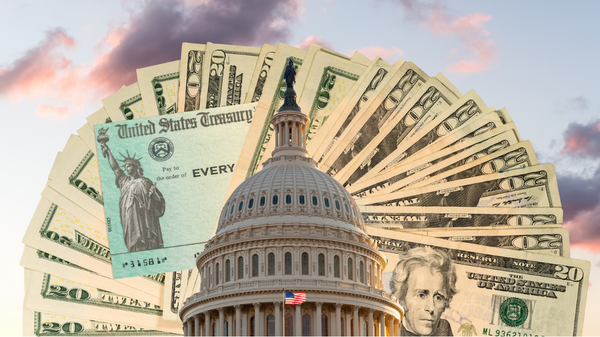Debt Threats: Congress returns to its ritual fight over the debt ceiling.
You need to SUBSCRIBE to Life, Liberty & Property. Read previous issues.
IN THIS ISSUE:
- Debt Threats
- Podcast of the Week: The End of Solitude: Selected Essays on Culture and Society (Guest: William Deresiewicz)
- ‘P’ Is for …
- For-Profit Government
- Cartoon
- Video of the Week: Paying Attention to Davos Doesn’t Make You a “Conspiracy Theorist,” it Means You’re Awake
- Bonus Video of the Week: Climate Lunacy and Unhinged Hypocrisy
Debt Threats

Once again, the federal government’s malignant effect on the economy is our top story. Now it’s a debate over whether to raise the debt ceiling.
President Joe Biden and congressional Democrats keep pushing for higher government spending on top of the astonishing Biden binge in the wake of the 2020 pandemic spending hikes, blithely ignoring its destructive effect on the economy. They need more debt if they are to accomplish that. Government spending is like crack cocaine to them.
The Republicans, now back in charge of the House of Representatives after two years in the wilderness, have been looking for ways to stop Biden without being characterized as cheapskates and horsewhipped out of the best cocktail parties. I wish them well in their pursuit of that impossible dream.
The U.S. government hit its borrowing limit last Thursday. The legal borrowing limit, that is. The present legal borrowing limit, to be exact. The government surpassed any common-sense, workable borrowing limit about 55 years ago.
(That government-spending surge began our long battle with monetary inflation, by the way. You didn’t think I’d get through an issue of this newsletter without mentioning inflation, did you?)
The debt ceiling had been “looming” (as the debt-mongers like to say) for quite some time, yet nobody did anything about it but accuse one another of not caring enough. The obvious explanation is that everyone is too terrified to discuss it in any serious way.
Or maybe, just maybe, it is because nobody in power takes the debt ceiling seriously as anything other than a rhetorical device. As the latest deadline approached, the U.S. Treasury announced it would start moving money around within the federal budget “to keep paying obligations to bondholders, Social Security recipients, and others until at least early June, the department said last week,” The Wall Street Journal reports. That kicks the can down the road for another five months.
Significantly, nobody in any position of power is suggesting not raising the debt ceiling.
Biden and the Democrats want a clean lifting of the limit—and a permanent removal if possible. The Democrats dearly love government spending, and with good reason. They enjoy getting credit for all the “free” goodies they hand out—plus the votes the government giveaways buy. In addition, the Dems know they can rely on Republicans to cut the budget deficit down the road when it becomes unsustainable, and the GOP will take all the heat for it, when and if they should ever control the White House and both chambers of Congress again. For Democrat politicians, federal spending is all gain and no pain.
Republicans, for their part, want to use the “looming” debt ceiling to force Biden and the congressional Democrats to agree to spending cuts. The Republicans are saying they’re willing to trade a higher debt ceiling now for the promise of lower spending later. We’ve seen repeatedly how reliable those promises are. In any case, Biden and the Senate Democrats say they won’t agree to any cuts. I believe them. Senate Minority Leader Mitch McConnell has expressed certainty the Republicans will give in. Perhaps that’s why he’s the minority leader and not a majority leader, but chances are he’s correct in his prediction.
Red Jahncke of the Townsend Group International sensibly suggests Republicans could “adopt a simple dollar-for-dollar approach, offering Democrats $1 of additional debt capacity for every $1 of domestic spending cuts today—not 10 years from now—leaving Democrats to designate what nonmilitary programs to cut.” Unfortunately, it won’t happen. Democrats know all they have to do is wait it out and Republicans will cave.
Republicans did obtain concessions from President Barack Obama in 2011 when the Tea Party faction led a firm refusal to raise the ceiling without budget cuts. Obama gave in to some spending reductions, and Congress agreed to increase the debt limit. Obama won reelection in 2012 and Democrats picked up seats in both houses of Congress (though the GOP retained control of the House).
Lesson learned. The debt ceiling was $14.3 trillion in 2011. It is now $31.4 trillion, after regular increases over the years with the GOP generally controlling one or both houses of Congress—and the Tea Party consigned to oblivion. The national debt has increased by about $3.7 trillion since Biden took office. Biden and a Democrat-controlled Congress piled that on top of the $4.4 trillion the government borrowed to deal with the pandemic during President Donald Trump’s last year in office. And with the Federal Reserve raising interest rates rapidly to combat the inflation this reckless spending brought on, the government’s interest payments are rising even faster.
Total U.S. gross domestic product is currently $25.72 trillion, the St. Louis Fed reports. That means the debt we U.S. taxpayers owe on past and present federal spending is 120 percent of the nation’s annual economic output. That number does not include other obligations that will kick in down the road and eat up additional trillions of dollars unless current laws are changed to eliminate those handouts, which Congress will never do voluntarily.
So, once again Congress and the president act out this timeworn ritual in which Democrats pretend the world will end if the federal government cannot borrow more money and Republicans make believe they are protecting the taxpayers by exacting promises the Democrats will never keep and the Republicans will never require them to honor. With the press and social media on their side and the public denied a hearing, the federal wastrels will get their way as usual.
The incentives for our national government are all wrong, and they are entirely in furtherance of continual spending increases in perpetuity until the U.S. economy can no longer support such extravagant improvidence and the Treasury is finally forced to default on the nation’s debt or watch spiraling inflation unleash devastating social chaos.
Don’t think it cannot happen. That day will come, and sooner than most people seem to think; but it is not today, and it is not tomorrow, so we will all go to bed tonight in the sure and stupid confidence that all will be well if we just ignore the wolves at the door.
Source: The Wall Street Journal





